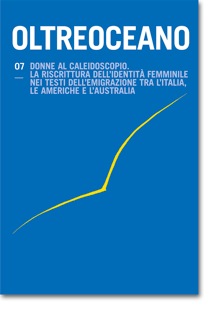Immigrazione ed emancipazione femminile in Puertas adentro di Lilia Lardone
Keywords:
immigrazione, emancipazione femminile, Lardone, AndruettoAbstract
Il saggio è dedicato a due romanzi argentini contemporanei nei quali il tema immigratorio mette in evidenza le problematiche relative all’emancipazione femminile. Le protagoniste dei testi appartengono a diverse generazioni della stessa famiglia di immigrati piemontesi. Tuttavia nel romanzo di Lardone l’immigrazione italiana regionale è il perno a partire dal quale si segue l’evoluzione a tappe –iniziatiche – delle protagoniste, mentre nel romanzo di Andruetto il fenomeno immigratorio è solo lo sfondo implicito delle vicende argentine che coinvolgono le tre generazioni di donne protagoniste della narrazione.
Women’s Migration and Emancipation in Puertas adentro (1998) by Lilia Lardone and Lengua madre (2010) by María Teresa Andruetto
The present study concerns two contemporary Argentinian novels in which the topic of migration stresses questions related to women’s emancipation. The protagonists belong to different generations of the same family. In Lardone’s novel Italian regional immigration is the keystone from which follows the evolution of the characters, while in Andruetto’s novel migration only functions as the implicit background for the events involving the three generations of women present in the narration.
Downloads
References
Battistini, A. (1990): Lo specchio di Dedalo. Autobiografia e biografia. Bologna: Il Mulino.
Blengino, V. (2011): Un’avventura di massa. Cento anni di immaginario sugli immigranti italiani in Argentina. Casoria: Loffredo.
Blengino, V. (1990): Más allá del océano. Un proyecto de identidad: los inmigrantes italianos en la Argentina. Buenos Aires: Centro Editor de América Latina.
Bodei, R. (2004): L’arcipelago e gli abissi. In P. Ricœur (Ed.), Ricordare, dimenticare, perdonare. L’enigma del passato (pp. VII-XVII). Bologna: Il Mulino.
Cattarulla, C. (2003): Di proprio pugno. Autobiografie di emigranti italiani in Argentina e Brasile. Reggio Emilia: Diabasis.
Cattarulla, C. & Magnani, I. (2004): L’azzardo e la pazienza. Donne emigrate nella narrativa argentina. Troina: Città Aperta.
Devoto, F. (2003): Historia de la inmigración en la Argentina. Buenos Aires: Sudamericana.
Fernández, A. M. (2010): La mujer de la ilusión. Pactos y contratos entre hombres y mujeres. Buenos Aires: Paidós.
Franzina, E. (2008): L’America gringa. Storie italiane d’immigrazione tra Argentina e Brasile. Reggio Emilia: Diabasis.
Lardone, L. (1998): Puertas adentro. Buenos Aires: Alfaguara.
Magnani, I. (2004): Tra memoria e finzione. L’immagine dell’immigrazione transoceanica nella narrativa argentina contemporanea. Reggio Emilia: Diabasis.
Magnani, I. (2012): L’onere di ricordare. In R. Tizziani, Il mare dell’oblio (pp. 7-22). Salerno-Milano: Oèdipus.
Onega, G. S. (1982): La inmigración en la literatura argentina (1880-1910). Buenos Aires: Centro Editor de América Latina.
Peyrot, B. (2006): La cittadinanza interiore. Troina: Città Aperta.
Ricœur, P. (2004): Ricordare, dimenticare, perdonare. L’enigma del passato. Bologna: Il Mulino.
Rocco, F. (2012): Marginalia ex-centrica. Viaggi /o nella letteratura argentina. Venezia: Studio LT2.
Sanfilippo, M. (2005): Problemi di storiografia dell’emigrazione italiana. Viterbo: Sette città.
Sanfilippo, M. & Corti, P. (Eds.), (2009): Storia d’Italia. Annali 24. Migrazioni. Torino: Einaudi.
Sanfilippo, M. & Corti, P. (Eds.), (2012): L’Italia e le migrazioni. Roma-Bari: Laterza.
Sarlo, B. (2012): Tiempo pasado. Cultura della memoria y giro subjetivo. Una discusión. Buenos Aires: Siglo Veintiuno.
Serafin, S. (2006): Scrittura come nuovo inizio. Riflessioni sul romanzo d’iniziazione al femminile nel Cono Sur. Venezia: Mazzanti.
Downloads
Published
How to Cite
Issue
Section
License

This work is licensed under a Creative Commons Attribution-NonCommercial-ShareAlike 4.0 International License.
The authors undertake to comply with the following conditions, which are considered accepted at the time of submission of their contributions.
The sending of a text implies that it is unpublished and not submitted to be published elsewhere.
1. If accepted, the author shall confer on the publisher the right to publish and distribute it both in paper form and in the online electronic edition. The published articles will be downloadable and made available in open access.
2. Provided that it correctly indicates that the first publication took place in the journal Oltreoceano. Rivista sulle migrazioni the author has the right to: a) reproduce the article in separate extracts or collected in a volume; b) publish the article on their personal website or teaching site provided that these sites are of a non-commercial nature; c) deposit the article in online archives of a non-commercial nature, linked to the institution they belong to or as part of projects for the non-commercial dissemination and open access of scientific works.
The use of contributions by third parties, for commercial or otherwise unauthorized purposes, is not allowed. The publisher declines all responsibility for the unauthorized use of the material published in the journal.












